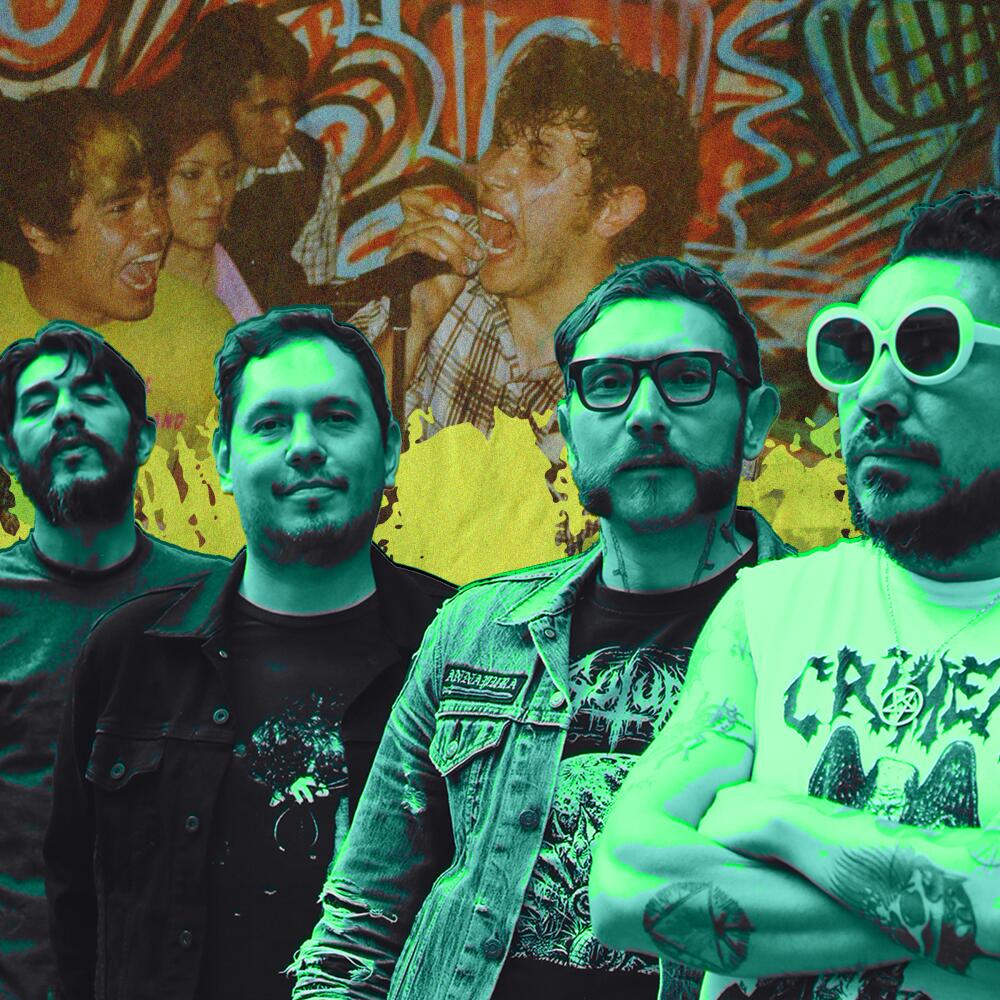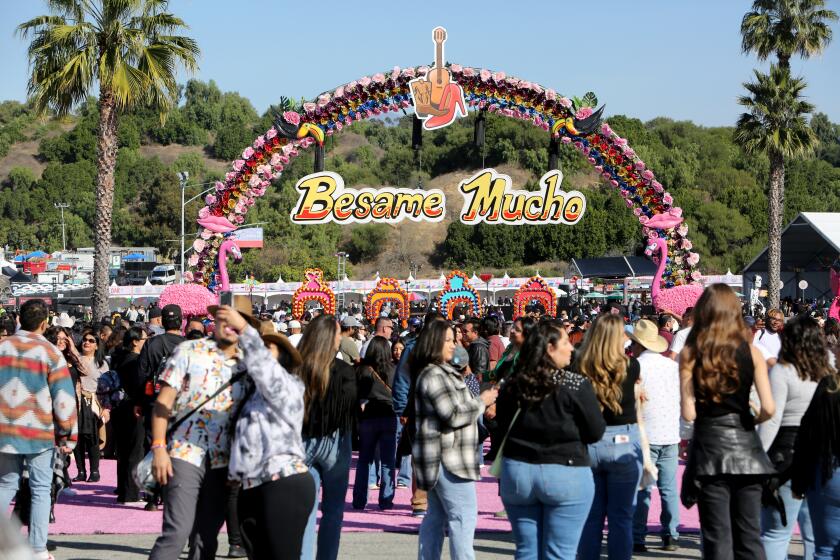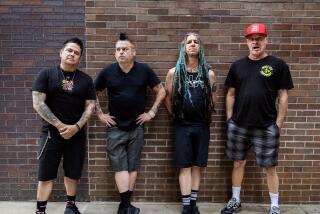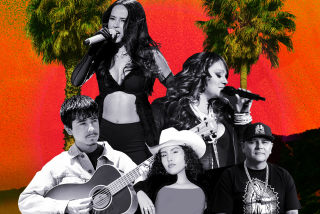
- Share via
The first time I heard Sad Breakfast was 23 years ago, in a garage packed with young adults in Mexico City.
Back then, the Mexico-U.S. relationship was not at its best. Immigration to the U.S. had significantly grown after the 1994-95 economic and political crisis, while globalization and the new regional free trade agreement pushed both countries to work together ... still under the control of the United States. Except for a short period of pre-9/11 ranchero friendship between Presidents Vicente Fox and George W. Bush, both nations were distant neighbors caught in a love-hate relationship.
The Latinx experience chronicled
Get the Latinx Files newsletter for stories that capture the multitudes within our communities.
You may occasionally receive promotional content from the Los Angeles Times.
Music was a reflection of that. The Rock en Español movement was at its peak. MTV Latino had just started, record labels were finally signing more local bands, and the veto from many Latin American governments against rock ‘n’ roll was disappearing. Bands like Café Tacvba, Los Aterciopelados and Soda Estéreo flooded the radio waves while selling millions of records.
From the Rio Grande to the Patagonia, el rock venía fuerte y en español. Latin American bands were expected not only to sing in español but also to play rock that should be, at least in some ways, influenced by our culture and traditions. Rock cargando el nopal, some would say, and not as an insult. And so “rock en tu idioma” consolidated as a strong brand and powerful product for record labels and concert promoters.
With four stages representing the past and present of Latin music, here are some of our favorite sets from the one-day festival at Dodger Stadium.
But what I found that evening in that garage was different.
Sad Breakfast, a creative emo response to a Happy Meal, had no nopales. Its music sounded sometimes hard, sometimes mellow. It was the sound of teenage angst. Its lyrics were emotional, melancholic and glaringly in English. It was an emo indie rock hecho en México with U.S. parts.
No managers. No record labels. No big ambitions. No Spanish. This was otra cosa.
Two cities and two carnales
It all started with two primos from Mexico City, Josué and Christian Guijosa.
Both considered Pearl Jam, Smashing Pumpkins and other grunge-era bands a great influence. After Josué’s sister migrated to Palm Springs in the ‘90s, their visits to California opened an entire new world of independent music and emo rock to them thanks to acts like Jimmy Eat World, Mineral and the Appleseed Cast.
The cousins, teenagers at the time, attended small shows in L.A. where they would discover new indie bands and learn about their style and insights into the music business.
“I had never heard that kind of music. Melancholic songs that could suddenly explode in a super rocker distortion,” Christian said.
And the music they heard would influence them to write music of their own. Sad Breakfast’s sound.
“We wanted to emulate what we heard from those bands that we learned from in the United States, specifically what we saw in L.A.,” Josué recalled.
After a couple of name changes and after adding Christian Covarrubias (vocals, guitar), Hugo Martinez (bass) and Emiliano Sandoval (drums), Sad Breakfast was born in 1998.
Breaking style barriers
Sad Breakfast didn’t want to be part of the mainstream. Both Christian and Josué recognized the talent of many contemporary Latino Spanish-speaking bands, but they wanted to create their style, in lyrics that weren’t Castilian and influences that weren’t wholly Latin American.
Christian said that some influences might come from Mexican folk and ballads, like José José or Juan Gabriel. But, in essence, it was all coming from what they’ve heard in English.

“We listened to a lot of gringo music since there is an obvious big influence of the United States in Mexico, and we knew it would be complicated in Mexico to become a hit singing in English, but we just wanted to do our thing,” said Christian. “We liked Caifanes, La Lupita, or Babasónicos, but in a way we wanted to rebel against the trends and not become an imitator of Café Tacvba or bands like that.”
Sad Breakfast didn’t want to play in big arenas or sell millions of records. Even as their popularity grew, they always stuck to small gigs, from houses to tiny concert halls. The Guijosas claimed managers and promoters tried several times to get them to change, but they always rejected the offers.
“Maybe there was some pride on my side against those bands, I admit it, but there was also respect towards them,” Josué said. “And I feel that we had to fight for their respect all the time. For them, we were like the Ugly Duckling of the scene.”
Sad Breakfast wanted to do what it liked, free of the pressure and what it considered mistreatment by the music industry. Like their indie U.S. idols, the band members would produce their own records, sell their own merch in their tocadas, manage themselves and share their music free on the internet, free of charge.
The band recorded three albums: “Don’t Try to Forget … That’s Why People Take Pictures” (2003), “The Time … to Come Back” (2005), and “Sad Breakfast” (2009). Shortly after the last record — its loudest and fully instrumental — Sad Breakfast disbanded. Christian was the first one to leave, starting the band Hummersqueal, which shared stages with bands such as Nine Inch Nails and played in California as the opening act for Zoé. Josué continued with his solo project Kill Aniston, which now tours around the U.S., Latin America and Spain. Covarrubias moved to Germany and Martinez to the Mexican beaches. Sandoval, creator of some of the band’s art for merch and covers, continued his career as a graphic designer.
The Legacy
Sad Breakfast was one of the first bands in Latin America to push hard against record label control. It dreamed of a world where people could listen to the music and bands they liked without any filters.
Part of the band’s legacy can be found in the acts it influenced. Math rock underground legends Austin TV, the noise experimental band Descartes A Kant and DJ Perro are just a few acts inspired by Sad Breakfast. In a way, Sad Breakfast was part of the underground starting point of a more universal Latino rock that didn’t need a label or a nationalistic grasp to exist — one that was able to cross borders and to talk to those who wanted something different.
This year, after a long hiatus, Sad Breakfast reunited (except for Covarrubias). The band members are in their early 40s, ready to play in festivals (they’ll be performing in March at Mexico City’s Vive Latino Festival) and rescue old audiences, while also trying to appeal to those who see in rock analternative from reggaetón or corridos tumbados.
And true to their nature, their first gig after reuniting in August was not in a big auditorium but inside a house in the hills of Mexico City.
Rodrigo Cervantes is a writer and illustrator from Mexico City, now based in Los Angeles. He is a former senior editor at LAist.com and Mexico bureau chief for KJZZ.
More to Read
The Latinx experience chronicled
Get the Latinx Files newsletter for stories that capture the multitudes within our communities.
You may occasionally receive promotional content from the Los Angeles Times.







